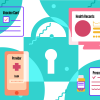Today, in many underdeveloped and emerging countries, inhabitants are more likely to have a cell phone than have a convenient access to a physician. In fact, medical clinics can sometimes be more than a day away from remote locations, and many laborers in such locations often can’t afford to miss a full day’s wages – and this makes medical visits nearly impossible. Many entrepreneurs are addressing various opportunities to leverage the computer in your cell phone to improve your health.
In Kurnool, located in Andhra Pradesh, India, a recurrent issue concerns the vaccination of children. In order to raise the number of children getting vaccinated, Nadim Mahmud, co-founder of Medic Mobile and his team have worked with a local immunization center to design a mobile-based reminder system for parents. Newly pregnant women are registered by local health workers in the records together with their cell phone number. Once the system was updated with an infant’s birth date, it schedules text message reminders to be sent to the family when it is time for a vaccination. Moreover, the system sends periodic educational messages about the importance of complete immunization and the diseases they protected against. Just six months of piloting this intervention, Mahmud and his team saw dramatic improvements in vaccination rates.
In Mexico, Medicall Home provides hotline-based healthcare services to over 5 million individuals. For only $5 per month, subscribers can reach qualified medical personnel for a diagnosis based on standardized clinical protocols. Members are also able to request at-home doctor visits at a reduced price. Moreover, subscribers can receive one free ambulance service and have access to a referral network health service providers such as doctors, hospitals, clinics and laboratories. The hotline receives an average of 90,000 calls per month. About two-thirds of incoming cases are resolved over the phone, eliminating the need for a doctor’s visit and lifting significant pressure from the healthcare system.
Let’s now talk about smartphones which are also enabling a quiet revolution in the medical profession and in the field of personal health. With the use of some accessories and a downloadable application, a smartphone can be the basis of measuring blood pressure, blood glucose or vision. It will also be easier for doctors to visit patients in remote areas since the only device they will need to carry is a smartphone or a tablet. Moreover, doctors could also send the real-time data to colleagues around the globe for further analysis and diagnosis. The new technology benefit not only doctors but also patients.
This year, at the TED conference in Long Beach California, a few minutes away from where I live, 29 year old Myshkin Ingawale from Mumbai demonstrated UChek, a urine test which you can perform with an simple iPhone app that analyzes chemical strips by first taking photos with your phone and then comparing the results that appear on the urine-soaked strip to a color-coded map. After analyzing the results, the app will display the levels of glucose, bilirubin, proteins, specific gravity, ketones, leukocytes, nitrites, urobilinogen and hematuria present in the urine. Seeing the kind of parameters that are analyzed, this app is potentially helpful for people with diabetes, and those with kidney, bladder and liver problems, or urinary tract infections.
Withings, a consumer electronics company located in Issy les Moulineaux, France produces a blood pressure monitor and cuff which plugs into an iPhone/iPad. The mobile platform is used to control the cuff, save and analyze the data, and optionally share the results with a physician or another party.
And more innovations are to come soon. We expect large medical device companies to become more active in this sectors once regulatory and physician acceptance issues are sorted out.
And me? I’ve just ordered the uChek kit at the introductory price of $20.
References:
Related Articles
-
“We are excited to combine Bomi’s talent, expertise and capabilities with UPS Healthcare—together, we will provide unmatched solutions to our customers, powered by UPS’s integrated, global smart logistics network.”
-
The revised cybersecurity draft publication is not intended to be a checklist for healthcare organizations to follow, but rather a guide to help them comply with the HIPAA Security Rule.
-
“We are extremely fortunate to have the opportunity to engage with Mark King in this particular phase of the company’s growth. My partner, Eric Wilhelm, and I hope to leverage Mark’s knowledge and experience to help realize the exciting vision…
-
Augmented reality (AR), with the help of artificial intelligence (AI), is providing healthcare professionals with the means to offer patients an unprecedented level of care and personalized treatments, and assisting MedTech and life sciences companies in product design and development.…





